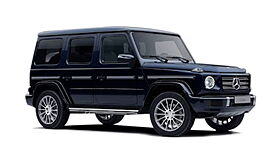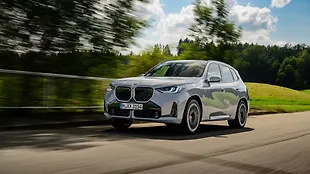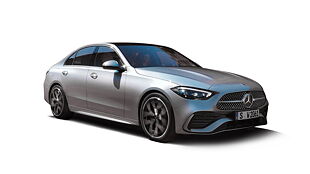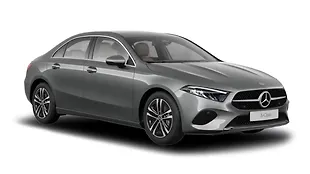Specifications

Mercedes-Benz G-Class G 400d Adventure Edition
- 275/55 R19 Pirelli Scorpion Zero tyres
- 241mm ground clearance
- Independent front suspension with double-wishbone and adaptive dampers
- Solid rear axle with adaptive dampers
- Permanent ‘4Matic’ 4x4 system, 40:60 power split as standard
- Three electronically actuated locking differentials - front, centre, and rear
Introduction

The Adventure Edition is the G-Class’ more rugged-looking version. Differentiating it from the AMG Line trim are one-size-smaller-but-still-huge 19-inch wheels and tyres, large mud flaps, matte-black highlights, and an unmissable roof-rack-plus-ladder combo. Underneath it all, the ‘base-spec’ G-Class uses the G 400 d’s powertrain, which is a turbocharged straight-six diesel engine paired to a 4x4 system with the added bonus of three locking differentials.

However, if you plan on never taking this off-roader into its natural habitat, it will not feel out of place in the urban jungle. It has expensive-looking parts everywhere - including the jewel-eyed all-LED headlamps, large twin-spoke alloy wheels, and doors with old-school button-press locks that open and shut with a satisfyingly crisp ‘thud’.

Part of the near Rs. 3 crore price tag of the G 400 d Adventure Edition is the luxurious cabin you would expect in a modern luxurious Mercedes-Benz. The G-Class is a proper five-seater with more-than-adequately bolstered, heated, and cooled front seats and a well-padded rear bench seat. The rich leather upholstery looks and smells like a million rupees, and the fit and finish around the cabin feel top-notch - except maybe some bits on the front centre console.

If you have never seen any other modern Mercedes-Benz interior, the twin screens would feel quite high-tech - but the centre screen is not touch-sensitive, the graphics are a bit old, and the system does not support wireless smartphone mirroring. But the G-Wagon is more about its off-road prowess than creature comforts.
CarWale Off-Road Day Tests Explained
CarWale’s Off-Road Day tests are designed to gauge SUVs in a trail-driving scenario, rather than hardcore off-roading - a simulation of driving conditions most SUV owners will be willing to traverse. These include:
Acceleration Test

Imagine you have a steep incline in front of you and you need to get to the top. The engine of your SUV needs to develop loads of torque low down and quickly. Its tyres should be able to dig down into whatever terrain you are on and transfer the power perfectly. Finally, the traction control system needs to let some slip take place without losing control of all that momentum generated. This test finds out how quickly an SUV can traverse a 40-metre stretch while keeping things under control.
Hill Descent Challenge

What goes up, needs to go down too - and when faced with a steep slope down, you need to be even more careful. During the age of the old-school SUV, you had to use low-range gears along with your own skills to steadily tackle a slope - braking wasn’t an option unless you wanted to execute an involuntary frontflip and if the low-range gearing wasn't slow enough - an extra-crunchy end was guaranteed at the bottom of the hill. Almost all SUVs worth their salt nowadays offer a hill-descent function, and this test finds out how effective they are.
The Slalom Run

Trail driving can become tedious if your SUV cannot turn easily in a quick but safe manner. We added a new challenge in our slalom tests to see if an ever-curving slalom course could unsettle the SUVs.
The Beaker Test

What use is all that suspension travel and complicated damping if it cannot keep the occupants in your SUV from being thrown around? Add an almost overflowing water beaker to the mix and you pray all that marketing talk about the suspension is actually more than just words on a piece of paper (or digital screen).
The Timed Lap

This puts the SUVs out of their comfort zone, through a twisting-but-fast course. It can be a recipe for adrenaline-pumping, ego-boosting action with the potential for everything to go wrong in an instant.
How the Mercedes-Benz G-Class Performed
After two days of gruelling but fun activities, here’s how the G-Class fared in the tests

Acceleration Test
| Mercedes-Benz G-Class | 4.47 seconds |
| Land Rover Defender | 4.50 seconds |
| Maruti Suzuki Jimny | 4.50 seconds |
| Toyota Hilux | 4.84 seconds |
| Mahindra Thar | 5.06 seconds |
| MG Gloster | 5.09 seconds |
The G-Wagon was the quickest in the acceleration test. 700Nm of mountain-moving torque developed from a very low 1200rpm, a seamless nine-speed automatic transmission and a rock-solid traction control system make this an effortless win.

Hill Descent Challenge
| Land Rover Defender | 41.97 seconds |
| Mercedes-Benz G-Class | 29.50 seconds |
| Toyota Hilux | 18.59 seconds |
| Mahindra Thar | 17.69 seconds |
| Maruti Suzuki Jimny | 15.16 seconds |
| MG Gloster | 14.00 seconds |
The G-Wagon’s slow time was achieved by pure mechanical design - no electronics were involved at all! But we had to shift the transmission to manual mode and switch to first gear to achieve this jaw-dropping feat.

The Slalom Run
| Mercedes-Benz G-Class | 13.53 seconds |
| Maruti Suzuki Jimny | 13.93 seconds |
| Land Rover Defender | 13.97 seconds |
| Mahindra Thar | 14.19 seconds |
| Toyota Hilux | 15.53 seconds |
| MG Gloster | 16.00 seconds |
This test is proof of why power is useless without control. Despite weighing over 2.4 tonnes, the G-Wagon was quicker than the smallest SUV in the test - the Maruti Suzuki Jimny. With good throttle control, small steering inputs were enough to tackle the winding course without any effort.

The Beaker Test
| MG Gloster | 430 ml |
| Land Rover Defender | 420ml |
| Mercedes-Benz G-Class | 390ml |
| Mahindra Thar | 380ml |
| Maruti Suzuki Jimny | 380ml |
| Toyota Hilux | 360ml |
With an almost overflowing 500ml beaker, both, the suspension setup of the SUV and our gimbal-like reflexes were put to the test. The G-Wagon has a solid rear axle, which combined with the long-travel suspension offers great traction in even the toughest of axle-twisting obstacles. On the flip side, this had the potential to turn the SUV into a bucking bronco. The long suspension travel and adaptive dampers came to the rescue during the test, with most of the water lost during the brutal initial acceleration off the line.

The Timed Lap
| MG Gloster | 51.62 seconds |
| Mercedes-Benz G-Class | 51.72 seconds |
| Land Rover Defender | 55.68 seconds |
| Toyota Hilux | 59.37 seconds |
| Mahindra Thar | 59.40 seconds |
| Maruti Suzuki Jimny | 1 minute 6.60 seconds |
We expected the results of the full course test to mirror that of the slalom test. The course was full of twists and turns with very little space for the more powerful SUVs to deploy their performance advantage... or so we thought. Transferring all the power to the slippery surface was most important, and the Gloster’s soft suspension and almost perfectly spaced gears helped it win this challenge. On the other hand, the G-Wagon was a picture of mature, effortless performance - again, without a need to select any of its many driving modes.
Tester’s Notes

- The G 400 d doesn’t have launch control, but you can brake boost to get an energetic launch off the line on any surface.

- There are no off-road modes or assists available at all. Long-pressing the ‘low-range’ button on the lower centre console activates the ‘G-Mode’, but nowhere on the twin screens is it made clear what that exactly does.

- You must slot the transmission into manual mode and select the first gear to descend slopes slowly. While this is more effective than hill-descent modes offered on many other SUVs, you may not be able to exploit this feature if you haven’t read the owner’s manual or if no one informed you about it. There are no warnings or tips on the digital screens, so it’s important to be aware of this feature.

- While selecting drive modes using the toggle switch on the centre console, you can see the ‘Desert Mode’ on the screen. You need to hold the button down to select it, but there is no indication on the screen that you need to do so. Once you are able to select this mode, dune bashing becomes easy, and so does your ability to hold long power slides on dirt!

- The smaller 19-inch wheels and tyres do not make replacing them any easier, especially off-road. We found this the hard way after damaging a tyre on the course. The screw-type jack is not ideal for changing tyres on uneven surfaces, a detail Mercedes should improve.
Conclusion

You barely scratch the surface of the G-Wagon’s abilities at the best of times. Even after investing Rs. 3 crore on the SUV, you need to invest in yourself to truly know and be wowed by its abilities. Reading the owner’s manual may bestow you with knowledge unknown to most mortals. However, to gain practical experience, you may want to pay Mercedes-Benz for an experiential tour of the off-road course at its Centre of Excellence, or any of the off-road events held worldwide - which may just be enough to finally match the legendary prowess of this SUV.

Or you can ignore all of it and just use the G 400 d Adventure Edition as a status-symbol, high-street cruiser. No one will ever doubt you have the ability to conquer the toughest terrains on Earth - because you drive a Mercedes-Benz G-Class!
Picture by Kapil Angane and Kaustubh Gandhi



























